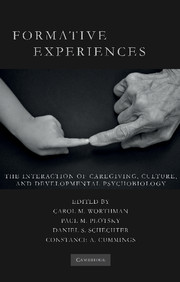Book contents
- Frontmatter
- Contents
- List of Figures
- List of Tables
- List of Contributors
- Foreword by Robert Sapolsky
- Preface
- List of Abbreviations
- Introduction
- SECTION ONE HISTORICAL, CROSS-CULTURAL, AND DEVELOPMENTAL SCIENCE PERSPECTIVES
- SECTION TWO HOW EXPERIENCE INTERACTS WITH BIOLOGICAL DEVELOPMENT
- SECTION THREE FORMATIVE RELATIONSHIPS WITHIN AND ACROSS GENERATIONS
- 7 Ethnographic Case Study: Bofi Foragers and Farmers – Case Studies on the Determinants of Parenting Behavior and Early Childhood Experiences
- Commentary
- Commentary
- 8 Clinical Case Study: Good Expectations – A Case Study of Perinatal Child-Parent Psychotherapy to Prevent the Intergenerational Transmission of Trauma
- Commentary
- Commentary
- 9 Ethological Case Study: Infant Abuse in Rhesus Macaques
- Commentary
- Commentary
- 10 Clinical Case Study: Multigenerational Ataques De Nervios in a Dominican American Family – A Form of Intergenerational Transmission of Violent Trauma?
- Commentary
- Commentary
- SECTION FOUR SOCIAL AND CULTURAL CONTEXTS OF CHILDHOOD DEVELOPMENT – NORMATIVE SETTINGS, PRACTICES, AND CONSEQUENCES
- SECTION FIVE FEAR, FUN, AND THE BOUNDARIES OF SOCIAL EXPERIENCE
- SECTION SIX PUBLIC HEALTH, EDUCATION, AND POLICY IMPLICATIONS
- Index
- References
Commentary
Published online by Cambridge University Press: 26 May 2010
- Frontmatter
- Contents
- List of Figures
- List of Tables
- List of Contributors
- Foreword by Robert Sapolsky
- Preface
- List of Abbreviations
- Introduction
- SECTION ONE HISTORICAL, CROSS-CULTURAL, AND DEVELOPMENTAL SCIENCE PERSPECTIVES
- SECTION TWO HOW EXPERIENCE INTERACTS WITH BIOLOGICAL DEVELOPMENT
- SECTION THREE FORMATIVE RELATIONSHIPS WITHIN AND ACROSS GENERATIONS
- 7 Ethnographic Case Study: Bofi Foragers and Farmers – Case Studies on the Determinants of Parenting Behavior and Early Childhood Experiences
- Commentary
- Commentary
- 8 Clinical Case Study: Good Expectations – A Case Study of Perinatal Child-Parent Psychotherapy to Prevent the Intergenerational Transmission of Trauma
- Commentary
- Commentary
- 9 Ethological Case Study: Infant Abuse in Rhesus Macaques
- Commentary
- Commentary
- 10 Clinical Case Study: Multigenerational Ataques De Nervios in a Dominican American Family – A Form of Intergenerational Transmission of Violent Trauma?
- Commentary
- Commentary
- SECTION FOUR SOCIAL AND CULTURAL CONTEXTS OF CHILDHOOD DEVELOPMENT – NORMATIVE SETTINGS, PRACTICES, AND CONSEQUENCES
- SECTION FIVE FEAR, FUN, AND THE BOUNDARIES OF SOCIAL EXPERIENCE
- SECTION SIX PUBLIC HEALTH, EDUCATION, AND POLICY IMPLICATIONS
- Index
- References
Summary
INTRODUCTION
This study illustrates, in a very convincing way, that widely different parent-infant interaction patterns can evolve to become stable and adaptive components of two different but equally successful sub-cultures, existing within the same geographical and linguistic context. When I recall Fouts's observations that in the Bofi farmer tribe it is routine for parents to leave their 2- to 4-year-old toddlers with their 5- to 7-year-old siblings all day without adult supervision, I realized that such practices in our culture are likely to be grounds for removal of children from parental custody by child welfare agencies.
The implications of Fouts's paper are far-reaching. Those of us in the health care and social welfare professions must not simply assume that certain forms of mother-child interactions are “healthy” and other practices are “pathological.” Furthermore, it strongly suggests that we review our ideas of “resilience” and “vulnerability,” as well as our efforts to design interventions, in the light of a broader context of biological and social evolution.
Comments
The results of these studies lead to a number of further questions. Ideally, we would like to know, in some detail, how the cultural, psychological, and biological components of the two Bofi tribes' different early caregiving patterns interact in preparing their children for the different kinds of lives they will lead when they are adolescents and adults. But we know a great deal less about biological than about cultural or psychological components of early parenting effects on the developing young.
- Type
- Chapter
- Information
- Formative ExperiencesThe Interaction of Caregiving, Culture, and Developmental Psychobiology, pp. 184 - 190Publisher: Cambridge University PressPrint publication year: 2010

